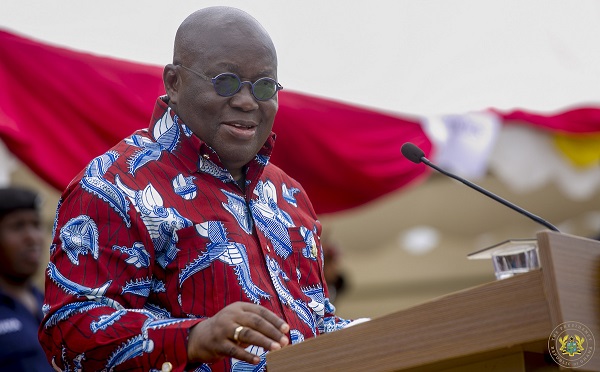
Financial sector crises biggest challenge — Akufo-Addo
President Nana Addo Dankwa Akufo-Addo has singled out the financial sector challenges as the “most difficult problem” that his government was confronted with when it assumed office four years ago.
Giving an account of his first tenure in office at his last State of the Nation Address (SONA) to Parliament yesterday, the President said when the government took over in January 2017, it realised that many of the banks were in distress and had been kept in unsustainable and artificial life support.
He said the finance houses were virtually operated as “glorified ponzi schemes” and fleecing customers of their investments.
He said it took a new leadership at the Bank of Ghana and the Securities and Exchange Commission (SEC) to identify the weak institutions, revoke their licences and administer a bailout package of GH¢21 billion from the public purse to protect depositors’ funds and the entire financial sector from collapsing.
President Akufo-Addo said the clean-up exercise in the banking and financial sector had enabled a more robust financial and banking services sector to emerge – one that was now better placed to finance the rapid development of the nation.
SONA
This year’s SONA was President Akufo-Addo’s fourth and last under his first term in office which elapses on the midnight of January 6.
The President used the opportunity to give account of his stewardship, from security through political to the economy.
In an apparent ranking of the issues that confronted his administration, Nana Akufo-Addo said “probably, the most difficult problem the government met on coming into office was the state of the banking and financial sector”.
“Many of our banks were in distress, and had been kept on unsustainable and artificial life support by the central bank. The supervisory agencies were, unfortunately, not performing their duties, and the governance and management structures of many of the banks were clearly not adequate.
“If truth be told, many of the finance houses were running what can only be called glorified ponzi schemes, and had lured many depositors into these schemes,” he said, adding that the country was in a “desperate situation, and urgent, radical measures had to be taken to prevent the collapse of the entire financial and banking sector,” he said.
Lessons
President Akufo-Addo said although the tough decisions taken by the government had led to the creation of a robust and respectable financial sector, the country needed to learn some “painful lessons” from the debacle.
“There is no question that many people got attracted to the unsustainable high interest rates that some of these financial houses were offering. In all financial dealings, we have to accept what the experts tell us that, whenever whatever on offer sounds too good to be true, it invariably ends up being untrue and unsustainable,” he said.
He further assured affected depositors, investors and the general public that the government was committed to paying all validated claims.
He said he expected the process to be completed “soon” after the courts had granted the liquidation orders for the remaining failed fund management companies.
Background
The financial sector clean-up exercise started in August 2017 and ended in November 2019 within which the licences of about 470 banks, microfinance institutions, savings and loans, finance houses, among others had been revoked.
The exercise was supervised by the BoG and SEC, with the Ministry of Finance providing the needed financial policy support.
Rebounding economy
Touching on the economy, the President promised to initiate a raft of prudent measures to quicken fiscal consolidation for the deficit to fall and to help restore the economy back to the path of growth.
He said his government was not new in turning the economic fortunes around as it had done so between 2017 and 2019.
Nana Akufo-Addo said Ghana had achieved an enviable economic record under his leadership until 2020 when the COVID-19 emerged and eroded some of the gains.
He said the pandemic succeeded in crashing growth from a target of 6.8 per cent to 1.9 per cent, which the government was now working to help reverse.
“The proactive decisions taken by government to fight the pandemic, as well as revitalise and transform the economy with the GH¢100 billion CARES ‘Obaatanpa’ Programme, anchors bright prospects for the medium-term,” he said.
